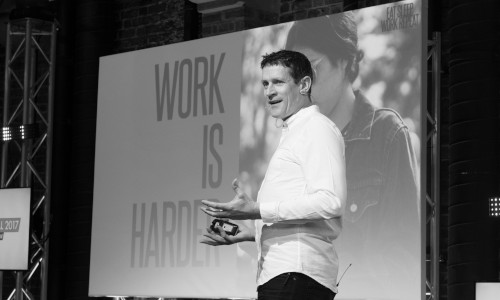“We’re not really evolving, the way that we work… it’s no wonder that a lot of us are finding work exhausting, repetitive, wears us down.”
Is your job wearing you down? Do you hate Mondays? Perhaps it’s not your work that’s the issue, but in fact the workplace culture. Before you jack it all in and start looking for gainful employment elsewhere, take a listen to Bruce Daisley.
You might know Bruce Daisley from his #1 Apple business chart topping podcast Eat, Sleep, Work, Repeat on work culture. Or you may know him as the former VP Europe for Twitter, having spent over a decade running Twitter and YouTube (the latter at Google) for Europe, leaving Twitter as its most senior leader outside of the US.
Regardless, he is an authority on the subject of workplace culture, now spending his time championing reforms to it and finding solutions to climate change.
This is Dom’s second recorded chat with Bruce (the first didn’t make it to publication) so luckily this one is all encompassing. Whether you’re the CEO or the new kid at the company, sit back and listen to this enlightening podcast episode, as Bruce talks about the things he’s learned along the way to make your work culture suck less.
On today’s podcast:
- The genesis of what made him do the podcast
- Why anyone can improve their workplace
- The challenges of remote working
- How to make open plan office space work for you
- How to build psychological safety with work colleagues
- Silent meetings
- Headphones in the office
The Joy of Work with Bruce Daisley
Why are some workplaces more enjoyable than others?
That is the question that Bruce Daisley strives to find the answer to, not only in his hugely popular, #1 Apple business chart podcast, Eat, Sleep, Work, Repeat, but also in his book, The Joy of Work, (which incidentally was the UK’s top selling business hardback of 2019 and is an international bestseller – translated into 14 languages.)
The Troublemaker’s Manifesto
“I became fascinated with what the mechanics of that [workplace culture] was. What was the way to make certain workplaces more enjoyable? [I] was searching for books myself on how to make my own workplace more enjoyable. And I wanted something that was a bit more directional, a bit more prescriptive.”
Bruce came up with the idea of a cookbook for creating great workplace culture – writing 30 interventions to improve workplace culture, to try to make work more enjoyable. With over half of Brits saying they feel burned out in their job, he didn’t want to write a book for bosses, he wanted to write a book for anyone to implement in their office.
“My feeling is that anyone can improve their workplace culture. Generally bosses don’t set out trying to tyrannise their workplaces, they’re not setting out to make people’s lives unhappy.”
The downsides of remote working
Over the years employers have gone to great lengths to try and incentivise their workforce to work harder, better, more efficiently. Introducing remote working, even open plan offices among many things, to encourage more employee interaction. But, according to Bruce, none of these have helped boost workplace culture. If anything, they’ve hurt it.
Yes, remote working is very liberating and freeing for a lot of people, giving them time to do the other things they need to do in life such as caring responsibilities. But remote working has downsides too.
Remote working removes the ability for colleagues to chew the fat for 15 minutes by the water cooler and get to know one another. And it’s during these unofficial brainstorming sessions that fresh ideas get touted and issues get resolved. These connections are just not possible when people work remotely.
“I’d seen some research that suggested that the optimal [for remote working] if you’re going to do it at all, was two days a week at home, three days a week in the office.”
And when you get people together you have to be really intentional about what you want them to achieve. You don’t want them sitting around wasting time watching another PowerPoint. If you’re going to get them together, have them actually engage and interact with each other.
So if these strategies aren’t going to improve workplace culture, what might?
Silent meetings
“I’m a big fan of trying to reduce the amount of meetings that anyone has and we were resolutely focused on that the last time I was there [at Twitter]. We were trying to abolish meetings. I talked a lot about silent meetings.”
The average Brit spends 16 hours each week in meetings. It’s become so bad that Amazon has sought a resolution to reduce this waste of time – they’ve implemented the concept of a silent meeting.
The powers that be believe that a meeting should only exist if there’s a decision to be made. So they create a 4 or 5 page memo, circulate it with the ins and outs of what the decision needs to be about, providing a rational argument for both sides and all the data necessary to make said decision. Then the key decision makers come together and sit in silence and read this memo, together, before making a decision based on what they’ve read.
Of course this isn’t the only way to improve office morale, but think about it, if you could spend less time in pointless meetings, wouldn’t you have more time to focus on actually doing your work? And wouldn’t that make you happier?

